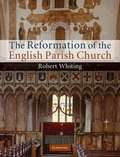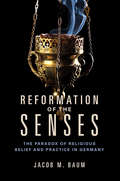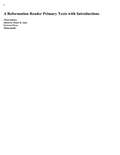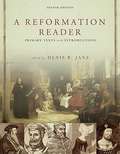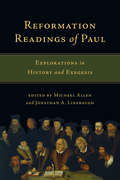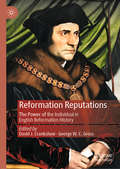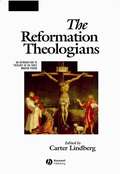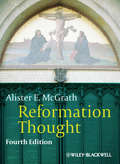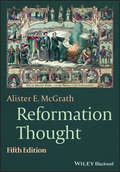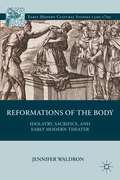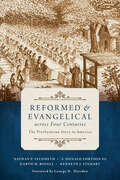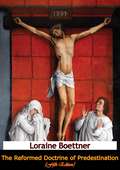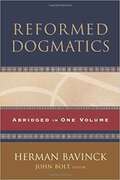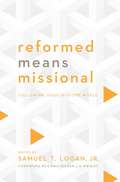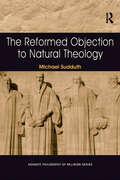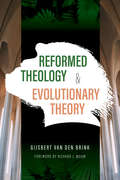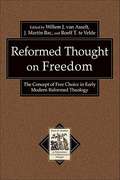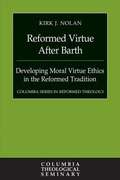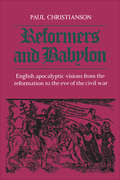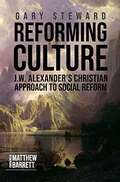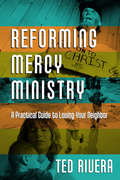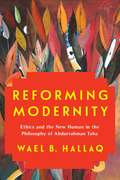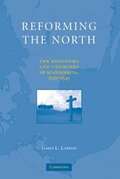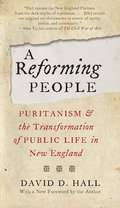- Table View
- List View
The Reformation of the English Parish Church
by Robert WhitingIn the sixteenth century, the people of England witnessed the physical transformation of their most valued buildings: their parish churches. This is the first ever full-scale investigation of the dramatic changes experienced by the English parish church during the English Reformation. By drawing on a wealth of documentary evidence, including court records, wills and church wardens' accounts, and by examining the material remains themselves such as screens, fonts, paintings, monuments, windows and other artefacts found in churches today, Robert Whiting reveals how, why and by whom these ancient buildings were transformed. He explores the reasons why Catholics revered the artefacts found in churches as well as why these objects became the subject of Protestant suspicion and hatred in subsequent years. This richly illustrated account sheds new light on the acts of destruction as well as the acts of creation that accompanied religious change over the course of the 'long' Reformation.
Reformation of the Senses: The Paradox of Religious Belief and Practice in Germany (Studies in Sensory History)
by Jacob M. BaumWe see the Protestant Reformation as the dawn of an austere, intellectual Christianity that uprooted a ritualized religion steeped in stimulating the senses--and by extension the faith--of its flock. Historians continue to use the idea as a potent framing device in presenting not just the history of Christianity but the origins of European modernity. Jacob M. Baum plumbs a wealth of primary source material from the fifteenth and sixteenth centuries to offer the first systematic study of the senses within the religious landscape of the German Reformation. Concentrating on urban Protestants, Baum details the engagement of Lutheran and Calvinist thought with traditional ritual practices. His surprising discovery: Reformation-era Germans echoed and even amplified medieval sensory practices. Yet Protestant intellectuals simultaneously cultivated the idea that the senses had no place in true religion. Exploring this paradox, Baum illuminates the sensory experience of religion and daily life at a crucial historical crossroads. Provocative and rich in new research, Reformation of the Senses reevaluates one of modern Christianity's most enduring myths.
A Reformation Reader: Primary Texts And Introductions, 3rd Edition
by Denis R. JanzAlthough deeply political, economic, and social, the European Reformations of the sixteenth century were at heart religious disputes over core Christian theological issues. Denis Janz's A Reformation Reader is unabashed in its generous selection of key theological and related texts from five distinct Reformation sites. The late-medieval background is richly discussed and the Lutheran, Calvinist, Radical, English, and Catholic Reformations are all thoroughly presented. A classroom staple for nearly 30 years, this new third edition of the text takes into account the needs of the contemporary classroom for primary source readings that are concise and focused on the subject matter at hand. Over 100 carefully selected primary documents are edited for even greater concision and capture the energy and moment of that tumultuous time. The saving of space results in a shorter, more tightly presented book that now includes even more readings! Students and teachers alike will appreciate the expanded range and fresh focus of this classic reader.
A Reformation Reader: Primary Texts with Introductions
by Denis R. Janz* More than 100 carefully edited primary Refomation documents *Key theological writings from Luther, Calvin, Zwingli, and more * Companion Web site features professor-and student-friendly resources
Reformation Readings of Paul: Explorations in History and Exegesis
by Michael AllenDid the Protestant Reformers understand Paul correctly? Has the church today been unduly influenced by Reformation-era misreadings of the Pauline epistles? These questions—especially as they pertain to Martin Luther's interpretation of the Pauline doctrine of justification—have been at the forefront of much discussion within biblical studies and theology in light of the New Perspective on Paul. But that leads to another question: Have we understood the Reformers correctly? With that in mind, these essays seek to enable a more careful reading of the Reformers' exegesis of Pauline texts. Each chapter pairs a Reformer with a Pauline letter and then brings together a historical theologian and a biblical scholar to examine these Reformation-era readings of Paul. In doing so, this volume seeks a better understanding of the Reformers and the true meaning of the biblical text.
Reformation Reputations: The Power of the Individual in English Reformation History
by David J. Crankshaw George W. C. GrossThis book highlights the pivotal roles of individuals in England’s complex sixteenth-century reformations. While many historians study broad themes, such as religious moderation, this volume is centred on the perspective that great changes are instigated not by themes, or ‘isms’, but rather by people – a point recently underlined in the 2017 quincentenary commemorations of Martin Luther’s protest in Germany. That sovereigns from Henry VIII to Elizabeth I largely drove religious policy in Tudor England is well known. Instead, the essays collected in this volume, inspired by the quincentenary and based upon original research, take a novel approach, emphasizing the agency of some of their most interesting subjects: Protestant and Roman Catholic, clerical and lay, men and women. With an introduction that establishes why the commemorative impulse was so powerful in this period and explores how reputations were constructed, perpetuated and manipulated, the authors of the nine succeeding chapters examine the reputations of three archbishops of Canterbury (Thomas Cranmer, Matthew Parker and John Whitgift), three pioneering bishops’ wives (Elizabeth Coverdale, Margaret Cranmer and Anne Hooper), two Roman Catholic martyrs (John Fisher and Thomas More), one evangelical martyr other than Cranmer (Anne Askew), two Jesuits (John Gerard and Robert Persons) and one author whose confessional identity remains contested (Anthony Munday). Partly biographical, though mainly historiographical, these essays offer refreshing new perspectives on why the selected figures are famed (or should be famed) and discuss what their reformation reputations tell us today.
The Reformation Theologians: An Introduction to Theology in the Early Modern Period
by Carter LindbergThe Reformation Theologians is the ideal introduction to the study of the sixteenth-century Reformations. It introduces the theological context, though, and contributions of theologians from this period, offering students and scholars an essential resource and insight. This comprehensive and lively book discusses all the major strands of Reformation thought and explores the work of a range of influential figures, including theologians and non-theologians, humanists, clergy and laity, men and women. The contributors to this volume are leading scholars in the field of historical and systematic theology. Accessibly structured, it covers the Humanist, Lutheran, Reformed, Roman Catholic, and "Radical" Theologians. An introductory chapter explores the interpretations of the Reformation and a concluding chapter explains the influence of Reformation theologies on the modern period. The text also includes useful bibliographies and a glossary of theological terms.
Reformation Thought: An Introduction
by Alister E. McGrathReformation Thought, 4th edition offers an ideal introduction to the central ideas of the European reformations for students of theology and history. Written by the bestselling author and renowned theologian, Alister McGrath, this engaging guide is accessible to students with no prior knowledge of Christian theology. This new edition of a classic text has been updated throughout with the very latest scholarship Includes greater coverage of the Catholic reformation, the counter-reformation, and the impact of women on the reformation Explores the core ideas and issues of the reformation in terms that can be easily understood by those new to the field Student-friendly features include images, updated bibliographies, a glossary, and a chronology of political and historical ideas This latest edition retains all the features which made the previous editions so popular with readers, while McGrath's revisions have ensured it remains the essential student guide to the subject.
Reformation Thought: An Introduction
by Alister E. McGrathReformation Thought Praise for previous editions:“Theologically informed, lucid, supremely accessible: no wonder McGrath’s introduction to the Reformation has staying power!”—Denis R. Janz, Loyola University“Vigorous, brisk, and highly stimulating. The reader will be thoroughly engaged from the outset, and considerably enlightened at the end.”—Dr. John Platt, Oxford University“[McGrath] is one of the best scholars and teachers of the Reformation... Teachers will rejoice in this wonderfully useful book.”—Teaching HistoryReformation Thought: An Introduction is a clear, engaging, and accessible introduction to the European Reformation of the sixteenth century. Written for readers with little to no knowledge of Christian theology or history, this indispensable guide surveys the ideas of the prominent thought leaders of the period, as well as its many movements, including Lutheranism, Calvinism, Anabaptism, and the Catholic and English Reformations. The text offers readers a framework to interpret the events of the Reformation in full view of the intellectual landscape and socio-political issues that fueled its development.Based on Alister McGrath’s acclaimed lecture course at Oxford University, the fully updated fifth edition incorporates the latest academic research in historical theology. Revised and expanded chapters describe the cultural backdrop of the Reformation, discuss the Reformation’s background in late Renaissance humanism and medieval scholasticism, and distill the findings of recent scholarship, including work on the history of the Christian doctrine of justification. A wealth of pedagogical features—including illustrations, updated bibliographies, a glossary, a chronology of political and historical ideas, and several appendices—supplement McGrath’s clear explanations.Written by a world-renowned theologian, Reformation Thought: An Introduction, Fifth Edition upholds its reputation as the ideal resource for university and seminary courses on Reformation thought and the widespread change it inspired in Christian belief and practice.
Reformation Unbound
by Karl Gunther"Fundamentally revising the understanding of the nature and intellectual contours of early English Protestantism, Karl Gunther argues that sixteenth- century English evangelicals were calling for reforms and envisioning godly life in ways that were far more radical than have hitherto been appreciated. Typically such ideas have been seen as later historical developments, associated especially with radical puritanism, but Gunther's work draws attention to their development in the earliest decades of the English Reformation. Along the way, the book offers new interpretations of central episodes in this period of England's history, such as the "Troubles at Frankfurt" under Mary and the Elizabethan vestments controversy. By shedding new light on early English Protestantism, the book ultimately casts the later development of puritanism in a new light, enabling us to re-situate it in a history of radical Protestant thought that reaches back to the beginnings of the English Reformation itself"--
Reformations Of The Body
by Jennifer WaldronThis project takes the human body and the bodily senses as joints that articulate new kinds of connections between church and theatre and overturns a longstanding notion about theatrical phenomenology in this period.
Reformed and Evangelical across Four Centuries: The Presbyterian Story in America
by Nathan Feldmeth S. Donald Fortson III Garth M. Rosell Kenneth J. StewartA definitive history of evangelical Presbyterianism in America Reformed and Evangelical across Four Centuries tells the story of the Presbyterian church in the United States, beginning with its British foundations and extending to its present-day expression in multiple American Presbyterian denominations. This account emphasizes the role of the evangelical movement in shaping various Presbyterian bodies in America, especially in the twentieth century amid increasing departures from traditional Calvinism, historic orthodoxy, and a focus on biblical authority. Particular attention is also given to crucial elements of diversity in the Presbyterian story, with increasing numbers of African American, Latino/a, and Korean American Presbyterians—among others—in the twenty-first century. Overall, this book will be a bountiful resource to anyone curious about what it means to be Presbyterian in the multidimensional American context, as well as to anyone looking to understand this piece of the larger history of Christianity in the United States.
The Reformed Doctrine of Predestination [Fifth Edition]
by Loraine BoettnerFirst published in 1941, this is the Fifth Edition of Loraine Boettner’s 1932 publication The Reformed Doctrine of Predestination and is widely considered to be one of the 20th-century’s most reasoned explanations of the sovereignty of God and the Reformed interpretation of salvation.“THE purpose of this book is not to set forth a new system of theological thought, but to give a restatement to that great system which is known as the Reformed Faith or Calvinism, and to show that this is beyond all doubt the teaching of the Bible and of reason.”—Loraine Boettner, Introduction“Whoever really wants to know what Calvinism teaches cannot do better than to read this book from cover to cover”.—United Presbyterian magazine
Reformed Dogmatics: Abridged in One Volume
by John Bolt Herman BavinckHerman Bavinck's four-volume Reformed Dogmatics is one of the most important theological works of the twentieth century. The recently completed English translation has received wide acclaim. <p><p> Now John Bolt, one of the world's leading experts on Bavinck and editor of Bavinck's four-volume set, has abridged the work in one volume, offering students, pastors, and lay readers an accessible summary of Bavinck's masterwork. This volume presents the core of Bavinck's thought and offers explanatory materials, making available to a wider audience some of the finest Dutch Reformed theology ever written.
Reformed Means Missional: Following Jesus into the World
by Samuel T. LoganChristians are not on a mission for God; his church is on his mission--the mission of bringing the grace of Christ to sinners; the mission of bringing the whole world into obedience to Christ; and the mission of filling the world with his fame and glory. Being on God's mission means following Jesus into the world, often an evil and frightening place. It is a place of idolatry, relativism, and secularism; it is a place where sexual abuse and child abuse occur; it is a place of pain and poverty and disease; it is a place of sexual dysfunction. But it was to this place that Jesus came, and we do him honor as we follow him into the world bringing the good news of the total redeeming work of Christ.Reformed Means Missional gathers Reformed leaders from all across the globe to demonstrate why and how the church must be on God's mission of bringing grace, holiness, compassion, and justice to a world of sin and suffering.
The Reformed Objection to Natural Theology (Routledge Philosophy of Religion Series)
by Michael SudduthMichael Sudduth examines three prominent objections to natural theology that have emerged in the Reformed streams of the Protestant theological tradition: objections from the immediacy of our knowledge of God, the noetic effects of sin, and the logic of theistic arguments. Distinguishing between the project of natural theology and particular models of natural theology, Sudduth argues that none of the main Reformed objections is successful as an objection to the project of natural theology itself. One particular model of natural theology - the dogmatic model - is best suited to handle Reformed concerns over natural theology. According to this model, rational theistic arguments represent the reflective reconstruction of the natural knowledge of God by the Christian in the context of dogmatic theology. Informed by both contemporary religious epistemology and the history of Protestant philosophical theology, Sudduth’'s examination illuminates the complex nature of the project of natural theology and its place in the Reformed tradition.
Reformed Theology and Evolutionary Theory
by Gijsbert Van den BrinkMany books aim to help beginners explore whether or not evolutionary science is compatible with Christian faith. This one probes more deeply to ask: What do we learn from modern evolutionary science about key issues that are of special theological concern? And what does Christian theology, especially in its Reformed expressions, say about those same key issues? Gijsbert van den Brink begins by describing the layers of meaning in the phrase &“evolutionary theory&” and exploring the question of how to interpret the Bible with regard to science. He then works through five key areas of potential conflict between evolutionary theory and Christian faith, spelling out scientific findings and analyzing Christian doctrinal concerns along the way. His conclusion: although some traditional doctrinal interpretations must be adjusted, evolutionary science is no obstacle to classical Christian faith.
Reformed Thought on Freedom: The Concept of Free Choice in Early Modern Reformed Theology
by J. Martin Bac Richard Muller Willem J. Van Asselt Roelf T. Te VeldeThis book makes a major contribution to historical scholarship on the problem of free choice and to contemporary debates over determinism and divine foreknowledge of future events. It fills a significant gap in Reformed knowledge by presenting sources in translation and commentary on works of major importance to the Protestant tradition that have been neglected for centuries. The book begins with an introductory discussion of free choice and the Reformed tradition and then moves on to examine the concept of freedom in the work of six early modern Reformers: Girolamo Zanchi, Franciscus Junius, Franciscus Gomarus, Gisbertus Voetius, Francesco Turrettini, and Bernardinus de Moor. It will be valued by all students of Reformed theology.
Reformed Virtue After Barth: Developing Moral Virtue Ethics in the Reformed Tradition
by Kirk J. NolanWith its focus on the traditions and communities that form us over the course of a lifetime, virtue ethics has richly expanded our understanding of what the Christian life can look like. Yet its emphasis on human virtues and habits of mind and life seems inconsistent with the Reformed tradition's insistence that sin lies at the heart of the human condition. For this reason, virtue ethics seems out of place in Reformed theology, especially in the company of the Reformed tradition's greatest twentieth-century theologian, Karl Barth. In this new addition to the Columbia Series in Reformed Theology, Kirk Nolan argues that Barth's theology actually proves virtue ethics can be compatible with the Reformed tradition. Rather than see virtue as an inevitable and natural process of growth, Barth helps us understand that development in the Christian life comes through a process of repetition and renewal, and that all virtue comes solely as a gift from God. Nolan establishes an important bridge between Reformed moral teaching and the tradition of virtue ethics.
Reformers and Babylon: English Apocalyptic Visions from the Reformation to the Eve of the Civil War
by Paul Kenneth ChristiansonStarting in the 1530s with John Bale, English reformers found in the apocalyptic mysteries of the Book of Revelation a framework for reinterpreting the history of Christianity and explaining the break from the Roman Catholic Church. Identifying the papacy with antichrist and the Roman Catholic Church with Babylon, they pictured the reformation as a departure from the false church that derived its jurisdiction from the devil. Those who took the initiative in throwing off the Roman yoke acted as instruments of God in the cosmic warfare against the power of evil that raged in the latter days of the world. The reformation ushered in the beginning of the end as prophesied by St. John.Reformers and Babylon examines the English apocalyptic tradition as developed in the works of religious thinkers both within and without the Established Church and distinguishes the various streams into which the tradition split. By the middle of Elizabeth's reign the mainstream apocalyptic interpretation was widely accepted within the Church of England. Under Charles I, however, it also provided a vocabulary of attack for critics of the Established Church. Using the same weapons that their ancestors had used to justify the reformation in the first place, reformers like John Bastwick, Henry Burton, William Prynne, and John Lilburne attacked the Church of England's growing sympathies with Romish ways and eventually prepared parliamentarians to take up arms against the royalist forces whom they saw as the forces of antichrist. Scholars of sixteenth- and seventeenth-century intellectual history will welcome this closely reasoned study of the background of religious dissent which underlay the politics of the time.
Reforming Culture: J. W. Alexander's Christian Approach To Social Reform
by Gary Steward Matthew BarrettHow should we address the social ills in our culture? How should we respond to the social and economic inequalities around us? James W. Alexander (1804-1859) thought deeply about these problems and wrote extensively about how these issues might be addressed from a Christian perspective. The son of Princeton Seminary's first faculty member, Alexander rose to prominence in the nineteenth century as a Christian leader in Virginia, New Jersey, and New York City. While he authored numerous books and articles, Alexander's contribution to evangelical thought has largely been overlooked. Alexander was deeply concerned about the economic, political, and social structures of antebellum American society, and he left behind a great deal of material that addressed these issues. In an age when social reformers traversed America with an abundance of novel ideas and utopian schemes, Alexander believed that the Christian gospel and the influence of Christian truth was the best means approach for bringing about lasting good in the world around us. Alexander's thoughts on government, economics, education, and race continue to be relevant for our own day. While the complexion of our social ills may have changed, the solution to needs of our culture have largely remained the same.
Reforming Mercy Ministry: A Practical Guide to Loving Your Neighbor
by Ted RiveraReforming Mercy Ministry
Reforming Modernity: Ethics and the New Human in the Philosophy of Abdurrahman Taha
by Wael HallaqReforming Modernity is a sweeping intellectual history and philosophical reflection built around the work of the Morocco-based philosopher Abdurrahman Taha, one of the most significant philosophers in the Islamic world since the colonial era. Wael B. Hallaq contends that Taha is at the forefront of forging a new, non-Western-centric philosophical tradition. He explores how Taha’s philosophical project sheds light on recent intellectual currents in the Islamic world and puts forth a formidable critique of Western and Islamic modernities.Hallaq argues that Taha’s project departs from—but leaves behind—the epistemological grounds in which most modern Muslim intellectuals have anchored their programs. Taha systematically rejects the modes of thought that have dominated the Muslim intellectual scene since the beginning of the twentieth century—nationalism, Marxism, secularism, political Islamism, and liberalism. Instead, he provides alternative ways of thinking, forcefully and virtuosically developing an ethical system with a view toward reforming existing modernities. Hallaq analyzes the ethical thread that runs throughout Taha’s oeuvre, illuminating how Taha weaves it into a discursive engagement with the central questions that plague modernity in both the West and the Muslim world. The first introduction to Taha’s ethical philosophy for Western audiences, Reforming Modernity presents his complex thought in an accessible way while engaging with it critically. Hallaq’s conversation with Taha’s work both proffers a cogent critique of modernity and points toward answers for its endemic and seemingly insoluble problems.
Reforming The North: The Kingdoms and Churches of Scandinavia, 1520-1545
by James L. LarsonThe turbulence of the Protestant Reformation marks a turning point in European history, but the Scandinavian contribution to this revolution is not well known outside the Northern world. Reforming the North focuses on twenty-five years (1520-1545 A.D.) of this history, during which Scandinavians terminated the medieval Union of Kalmar, toppled the Catholic Church, ended the commercial dominance of the German Hanse, and laid the foundations for centralized states on the ruins of old institutions and organizations. This book traces the chaotic and often violent transfer of resources and authority from the decentralized structures of medieval societies to the early modern states and their territorial churches. Religious reform is regarded as an essential element in the process - in the context of social unrest, political conflict, and long-term changes in finance, trade, and warfare. Reforming the North offers a broad perspective on this turbulent period and on the implications of the Protestant Reformation for Northern history.
A Reforming People
by David D. HallIn this revelatory account of the people who founded the New England colonies, historian David D. Hall compares the reforms they enacted with those attempted in England during the period of the English Revolution. Bringing with them a deep fear of arbitrary, unlimited authority, these settlers based their churches on the participation of laypeople and insisted on "consent" as a premise of all civil governance. Puritans also transformed civil and criminal law and the workings of courts with the intention of establishing equity. In this political and social history of the five New England colonies, Hall provides a masterful re-evaluation of the earliest moments of New England's history, revealing the colonists to be the most effective and daring reformers of their day.
